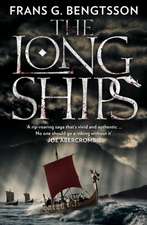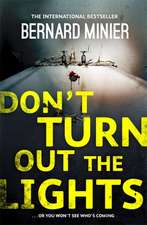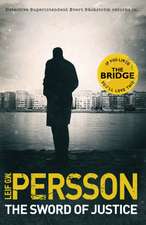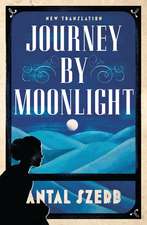Murder at the Savoy: Martin Beck Police Mysteries (Paperback)
Autor Per Wahloo, Maj Sjowall Traducere de Amy Knoespelen Limba Engleză Paperback – 31 mai 2009
| Toate formatele și edițiile | Preț | Express |
|---|---|---|
| Paperback (2) | 57.36 lei 3-5 săpt. | +8.94 lei 6-10 zile |
| HarperCollins Publishers – sep 2011 | 57.36 lei 3-5 săpt. | +8.94 lei 6-10 zile |
| Vintage Books USA – 31 mai 2009 | 107.46 lei 3-5 săpt. |
Preț: 107.46 lei
Nou
Puncte Express: 161
Preț estimativ în valută:
20.56€ • 22.41$ • 17.33£
20.56€ • 22.41$ • 17.33£
Carte disponibilă
Livrare economică 02-16 aprilie
Preluare comenzi: 021 569.72.76
Specificații
ISBN-13: 9780307390912
ISBN-10: 0307390918
Pagini: 216
Dimensiuni: 137 x 200 x 18 mm
Greutate: 0.25 kg
Editura: Vintage Books USA
Seria Martin Beck Police Mysteries (Paperback)
ISBN-10: 0307390918
Pagini: 216
Dimensiuni: 137 x 200 x 18 mm
Greutate: 0.25 kg
Editura: Vintage Books USA
Seria Martin Beck Police Mysteries (Paperback)
Notă biografică
Maj Sjöwall and Per Wahlöö, her husband and coauthor, wrote ten Martin Beck mysteries. Mr Wahlöö, who died in 1975, was a reporter for several Swedish newspapers and magazines and wrote numerous radio and television plays, film scripts, short stories, and novels. Maj Sjöwall is also a poet.
Extras
1The day was hot and stifling, without a breath of air. There had been a haze quivering in the atmosphere, but now the sky was high and clear, its colors shifting from rose to dusky blue. The sun's red disk would soon disappear beyond the island of Ven. The evening breeze, which was already rippling the smooth mirror of the Sound, brought weak puffs of agreeable freshness to the streets of Malmo. With the gentle wind came fumes of the rotting garbage and seaweed that had been washed up on Ribersborg Beach and in through the mouth of the harbor into the canals.The city doesn't resemble the rest of Sweden to a very great degree, largely because of its location. Malmo is closer to Rome than to the midnight sun, and the lights of the Danish coast twinkle along the horizon. And even if many winters are slushy and windblown, summers are just as often long and warm, filled with the song of the nightingale and scents from the lush vegetation of the expansive parks.Which is exactly the way it was that fair summer evening early in July 1969. It was also quiet, calm and quite deserted. The tourists weren't noticeable to any extent--they hardly ever are. As for the roaming, unwashed hash-smokers, only the first bands had arrived, and not so many more would show up either, since most of them never get past Copenhagen.It was rather quiet even in the big hotel across from the railroad station near the harbor. A few foreign businessmen were deliberating over their reservations at the reception desk. The checkroom attendant was reading one of the classics undisturbed in the depths of the cloakroom. The dimly lit bar contained only a couple of regular customers speaking in low voices and a bartender in a snow-white jacket.In the large eighteenth-century dining room to the right of the lobby there wasn't much going on either, even if it was somewhat livelier. A few tables were occupied, mostly by people who were sitting alone. The pianist was taking a break. In front of the swinging doors leading to the kitchen stood a waiter, hands behind his back, looking contemplatively out of the big open windows, probably lost in thoughts of the sand beaches not too far away.A dinner party of seven, a well dressed and solemn gathering of varying sexes and ages, was sitting in the back of the dining room. Their table was cluttered with glasses and fancy dishes, surrounded by champagne coolers. The restaurant personnel had discreetly withdrawn, for the host had just risen to speak.He was a tall man in late middle age, with a dark-blue shantung suit, iron gray hair and a deep suntan. He spoke calmly and skillfully, modulating his voice in subtly humorous phrases. The other six at the table sat watching him quietly; only one of them was smoking.Through the open windows came the sounds of passing cars, trains switching tracks at the station across the canal, a switchyard that is the largest in northern Europe, the abrupt hoarse tooting of a boat from Copenhagen, and somewhere on the bank of the canal a girl giggling.This was the scene that soft warm Wednesday in July, at approximately eight-thirty in the evening. It's essential to use the expression "approximately," for no one ever managed to pin down the exact time when it happened. On the other hand, what did happen is quite easy to describe.A man came in through the main entrance, cast a glance at the reception desk with the foreign businessmen and the uniformed attendant, passed the checkroom and the long narrow lobby outside of the bar, and walked into the dining room calmly and resolutely, with steps that weren't notably rapid. There was nothing remarkable about this man so far. No one looked at him; he did not bother to look around either.He passed the Hammond organ, the grand piano and the buffet with its array of glistening delicacies and continued past the two large pillars supporting the ceiling. With the same resolve he walked directly toward the party in the corner, where the host stood talking with his back turned to him. When the man was about five steps away, he thrust his right hand inside his suit coat. One of the women at the table looked at him, and the speaker half turned his head to see what was distracting her. He gave the approaching man a quick, indifferent glance, and started to turn back toward his guests, without a second's interruption in the comments he was making. At the same instant the newcomer pulled out a steel-blue object with a fluted butt and a long barrel, aimed carefully and shot the speaker in the head. The report was not shattering. It sounded more like the peaceful pop of a rifle in a shooting gallery at a fair.The bullet struck the speaker just behind the left ear, and he fell forward onto the table, his left cheek in the crenelated mashed potatoes around an exquisite fish casserole a la Frans Suell.Sticking the weapon into his pocket, the gunman turned sharply to the right, walked the few steps to the nearest open window, placed his left foot on the sill, swung himself over the low window, stepped into the flower box outside, hopped down onto the sidewalk and disappeared.At the table three windows away a diner in his fifties became rigid and stared with amazement, a glass of whisky halfway to his mouth. In front of him was a book that he had been pretending to read.The man with the suntan and the dark-blue shantung suit was not dead.Stirring, he said, "Ow! It hurts."Dead people don't usually complain. Besides, it didn't even look as if he were bleeding.2Per Mansson was sitting in his bachelor den on Regementsgatan, talking to his wife on the telephone. He was a Detective Inspector with the Malmo police force, and although he was married, he lived as a bachelor five days out of the week. For more than ten years he'd spent every free weekend with his wife--an arrangement which had so far satisfied both of them.He cradled the receiver with his left shoulder while he mixed a Gripenberger with his right hand. It was his favorite drink, consisting simply of a jigger of gin, crushed ice and grape soda in a big tumbler.His wife, who'd been to the movies, was telling him the plot of Gone With the Wind.It took some time, but Mansson listened patiently, because as soon as she had finished the story he planned to ward off their usual weekend get-together with the excuse that he had to work. Which was a lie.It was twenty minutes after nine in the evening.Mansson was sweating in spite of his light clothing--a fishnet undershirt and checkered shorts. He had closed the balcony door at the beginning of the conversation so that he wouldn't be disturbed by the rumble of the traffic from the street. Although the sun had long ago sunk behind the roofs of the buildings across the street, it was very warm in the room.He stirred his drink with a fork, which he was embarrassed to admit had been either stolen or taken by accident from a restaurant called "Oversten." Mansson wondered if a person could take a fork by accident and said, "Yes, I see. It was Leslie Howard then who . . . No, huh? Clark Gable? Uh-hmm . . ."Five minutes later she'd got to the end. He delivered his white lie and hung up.The telephone rang. Mansson didn't answer immediately. He was off work and wanted to keep it that way. He slowly drained his Gripenberger. Watching the evening sky darken, he lifted the receiver and answered, "Mansson.""This is Nilsson. That was a helluva long conversation. I've been trying to get you for half an hour."Nilsson was an Assistant Detective, on duty that night at the central police station on Davidshall Square. Mansson sighed."Well?" he said. "What's up?""A man has been shot in the dining room at the Savoy. I'm afraid I'm going to have to ask you to get over there."The glass was empty but still cold. Mansson picked it up and rolled it against his forehead with the palm of his hand."Is he dead?" he asked."Don't know," said Nilsson."Can't you send Skacke?""He's off. Impossible to get hold of. I'll keep looking for him. Backlund is there now, but you probably ought to . . ."Mansson gave a start and put down the glass."Backlund? Okay, I'll leave right away," he said.He promptly called a taxi, then put the receiver on the table. While dressing, he listened to the rasping voice from the receiver mechanically repeating the words "Taxi Central, one moment please" until his call was finally put through to the operator.Outside the Savoy Hotel several police cars were carelessly parked, and two patrolmen were blocking the entrance from a growing crowd of curious evening strollers jammed together at the bottom of the stairs.Mansson took in the scene as he paid for the cab, put the receipt in his pocket, observed that one of the patrolmen was being rather brusque and reflected that it wouldn't be long before Malmo's police force had as bad a reputation as their colleagues in Stockholm.He said nothing, however, only nodded as he walked past the uniformed patrolmen into the lobby. It was noisy there now. The hotel's entire staff had gathered and were chatting with each other and with some customers streaming out of the grill. Several policemen completed the picture. They seemed at a loss, unfamiliar with the surroundings. Evidently no one had told them how to act or what to expect.Mansson was a big man in his fifties. He was dressed casually in dacron pants and sandals, with his shirt out. He took a toothpick from his breast pocket, pulled off the paper wrapper and stuck it in his mouth. As he chewed, he methodically took stock of the situation. The toothpick was American, menthol-flavored; he'd picked it up on the train ferry Malmohus, which provides such things for its passengers.Standing by the door leading to the large dining room was a patrolman named Elofsson, whom Mansson thought was a little smarter than the others.He walked over to him and said, "What's the story?""Looks like someone's been shot.""Have you had any instructions?""Not a word.""What's Backlund doing?""Questioning witnesses.""Where's the man who was shot?""At the hospital, I guess."Elofsson turned slightly red. Then he said, "The ambulance got here before the police, obviously."Mansson sighed and went into the dining room.Backlund was standing by the table with the gleaming silver tureens questioning a waiter. He was an elderly man with glasses and ordinary features. Somehow he'd managed to become a First Assistant Detective. He was holding his notebook open in his hand, busily taking notes. Mansson stopped within hearing distance, but said nothing."And at what time did this happen?""Uh, about eight-thirty.""About?""Well, I don't know for sure.""In other words, you don't know what time it was.""No, I don't.""Rather odd," said Backlund."What?""I said, it seems rather odd. You have a wrist watch, don't you?""Of course.""And there is a clock on the wall over there, if I'm not mistaken.""Yes, but . . .""But what?""Both of them are wrong. Anyway, I didn't think of looking at the clock."Backlund appeared overwhelmed by the response. He put down the pad and pencil and began to clean his glasses. He took a deep breath, grabbed the notebook and started writing again."Even though you had two clocks at your disposal, you still didn't know what time it was.""Well, kind of.""We've got no use for 'kind of' answers.""But the clocks aren't synchronized. Mine's fast, and the clock over there's slow."Backlund consulted his Ultratron. "Odd," he said, writing something down.Mansson wondered what."So, you were standing here when the criminal walked by?""Yes.""Can you give me as full a description as possible?""I didn't really get a good look at him.""You didn't see the gunman?" said Backlund, startled."Well, yes, when he climbed out the window.""What did he look like?""I don't know. It was pretty far away, and that table was hidden by the pillar.""You mean you don't know what he looked like?""Not really.""How was he dressed then?""In a brown sport coat, I think.""Think.""Yeah. I only saw him for a second.""What else did he have on? Try pants, for example.""Sure, he had pants on.""Are you certain?""Well, it sure would have seemed a little . . . like you said, odd, otherwise. If he hadn't had any pants on, I mean."Backlund wrote furiously. Mansson started chewing on the other end of the toothpick and quietly said, "Say, Backlund?"The other man turned around and glared."I'm in the middle of questioning an important witness . . ."He broke off and said sullenly, "Oh, so it's you.""What's going on?""A man was shot in here," said Backlund in great earnest. "And you know who?""No.""Viktor Palmgren. The corporation president." Backlund laid heavy stress on the label."Oh, him," said Mansson. And thought, this'll be a helluva time. Aloud he said, "It happened over an hour ago and the gunman climbed out the window and got away.""It may look that way."Backlund never took anything for granted."Why are there six police cars outside?""I had them close off the area.""The whole block?""The scene of the crime," said Backlund."Get rid of everybody in uniform," Mansson said wearily. "It can't be very pleasant for the hotel to have police swarming around in the foyer and out on the street. Besides, they must be needed more some place else. Then try to get up a description. There has to be a better witness than this guy.""Naturally, we'll question everybody," said Backlund."All in due time," said Mansson. "But don't detain anyone who doesn't have something crucial to say. Just take names and addresses."Backlund looked at him suspiciously and said, "What are you planning to do?""Make some telephone calls," said Mansson."Who to?""The newspapers, to find out what's happened.""Was that supposed to be a joke?" said Backlund coldly."Right," said Mansson absentmindedly and looked around.Journalists and photographers were roaming around in the dining room. Some of them must have been there long before the police, and one or more had been on the spot in the grill or the bar when the famous shot was fired. Probably. If Mansson's suspicions proved correct."But the manual requires . . . ," Backlund began.
Recenzii
"So many of the elements that have become integral . . . in the police procedural started life in these ten novels. . . . Their plots are second to none."—Val McDermid “Magically successful, a series of crime novels you shouldn't miss.”—Minneapolis Tribune“It's hard to think of any other thriller writers (apart from Simenon perhaps) who can capture so much of a society in a couple of hundred pages and yet still hold true to the thriller form.”—Sean and Nicci French“One of the most authentic, gripping and profound collection of police procedurals ever accomplished.”—Michael Connelly
Descriere
After Viktor Palmgren, a powerful Swedish industrialist, is murdered, Beck is assigned to investigate. What he finds is a web of vice so despicable that it's hard to imagine who "wouldn't" want Palmgren dead.
















